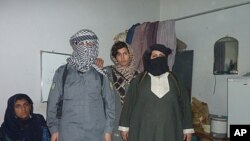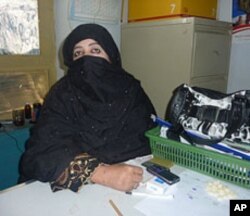The all-female police squad in Kandahar has one of the most dangerous jobs in Afghanistan. The city has long been at the heart of the country's southern insurgency.
At the end of a long corridor, behind a slightly cracked door, sit most of Kandahar's 15-member female police squad. The room smells of cigarette smoke and onions stewing in a small pressure cooker on the floor. The women drink tea, talk, smoke and occasionally nod-off. Different colored burqas are draped in one corner of the room, purses are scattered about, and a young girl who has recently run away from home cowers in the corner.
Parwana Farhadi, head of Kandahar's women police squad, sits at a desk opposite the door at the far end of the room. Farhadi, a mother of two, has been working in the squad for eight years.
She says she is the head of her family and has to bear all the family responsibilities. She says her police work is her "destiny." But she also says if anyone has a problem with her working, then they can provide for her family and she will quit.
Three years ago Malalai Kakar, Afghanistan's most senior woman officer, was sitting exactly where Parwana is today. As she left for work early one morning, Taliban militants shot her in the head, killing her and leaving her son seriously wounded.
Three female officers have lost their lives in the police headquarters and several others have also been killed in offices around the city . Parwana says as many as seven females working for the government have been killed so far, but she is not backing down.
She says she is not scared by her job. She says she is fulfilling an important role, because women should only be searched by females.
The need for female officers has increased in the past year, after insurgents started dressing as women in ambush operations. The attacks include one on the U.S. Embassy in Kabul and several others where bombers, wearing burqas, slip past checkpoints, smuggling in weapons to carry out assaults.
In Kandahar, women police say that, compared to their male counterparts, they face greater risk.
Nooria Noori, a criminal officer, says her job is "more insecure" than the work being done by men. She says women in Afghanistan face more threats from the Taliban than compared to men.
Many of the other women chime in, saying they need more protection. The women say their houses are located in insecure areas in the city and they are not given transportation to and from work. Several of the women tell of incidents of people being killed in front of their homes. They say this creates a feeling of terror.
Officer Muska Hamidi interrupts by saying that the women officers face other problems that men, in the same positions, do not.
She says the women officers should be able to drive vehicles. She says that now, only men are trained.
The female police force is tasked with many of the same missions of their male counterparts. They search homes, detain and arrest females accused of crimes. They say they only carry a pistol and the newer officers carry no weapons at all. Officer Pashtana Muhibi says the risks are very real, and then recalls an operation she went on.
She says she was patrolling with a soldier when they spotted a tunnel in the house. Although she volunteered to enter the tunnel first, the soldier took the job. As soon as he entered the tunnel, the Taliban opened fire. Two soldiers were killed.
Despite the dangers from militants, police squad head Parwana say she is still happy with the job, because it provides much-needed support for her family in a country where millions of people are unemployed.





